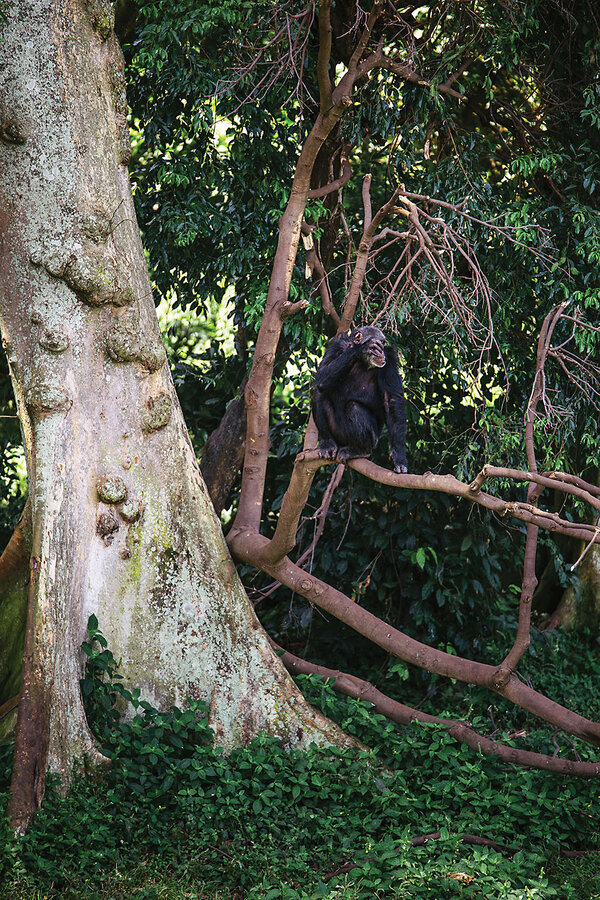Why Ugandan farmers gladly grow crops for chimps
Loading...
| Kasongoire, Uganda
Farmer Samuel Isingoma has planted 20 jackfruit trees on his 17-acre plot in the western Ugandan village of Kasongoire. The trees’ bounty is solely for chimpanzees.
“Since I support and give fruit to the chimps, they don’t disturb anything else,” Mr. Isingoma says.
Why We Wrote This
Clashes between humans and wildlife are as old as agriculture. In Uganda, farmers are ensuring a peaceful coexistence with chimpanzees by planting crops just for them.
With encouragement from the Jane Goodall Institute, Ugandan farmers are playing an important role in lessening the tensions between people and chimps as communities encroach on the animals’ habitat. Uganda is East Africa’s largest sugar cane producer and has one of the fastest-growing populations on the continent. The need to make space for homes and farms is reducing the forest cover that helps sustain chimpanzees.
James Byamukama, an executive director at the Jane Goodall Institute, says it’s critical to have discussions within communities rather than try to impose solutions. Community monitors from the institute’s Uganda chapter have recommended that farmers plant crops that aren’t so palatable to wildlife. Mr. Isingoma is taking the institute’s advice one step further by giving his fruit over to hungry chimps.
As a result, the farmer says, “I feel there isn’t much of a human-wildlife conflict.”
From the shade of a banana tree, Samuel Isingoma explains why he is sacrificing his precious jackfruit to chimpanzees.
“Since I support and give fruit to the chimps, they don’t disturb anything else,” says Mr. Isingoma, who has planted 20 jackfruit trees on his 17-acre plot in the western Ugandan village of Kasongoire. The trees’ bounty is solely for the primates.
With encouragement from the Jane Goodall Institute, a global conservation organization, Ugandan farmers are playing an important role in lessening the tensions between people and chimps as communities encroach on the animals’ habitat.
Why We Wrote This
Clashes between humans and wildlife are as old as agriculture. In Uganda, farmers are ensuring a peaceful coexistence with chimpanzees by planting crops just for them.
Uganda is East Africa’s largest sugar cane producer and has one of the fastest-growing populations on the continent. The need to make space for homes and farms is reducing the forest cover that helps sustain chimpanzees.
James Byamukama, an executive director at the Jane Goodall Institute, says it’s critical to have discussions within communities rather than try to impose solutions. Community monitors from the institute’s Uganda chapter have recommended that farmers plant crops that aren’t so palatable to wildlife. So about eight years ago, Mr. Isingoma started planting coffee beans, leaving behind the maize he used to cultivate.
Now he is taking the institute’s advice one step further by giving his fruit over to hungry chimps.
As a result, Mr. Isingoma says, “I feel there isn’t much of a human-wildlife conflict.”












